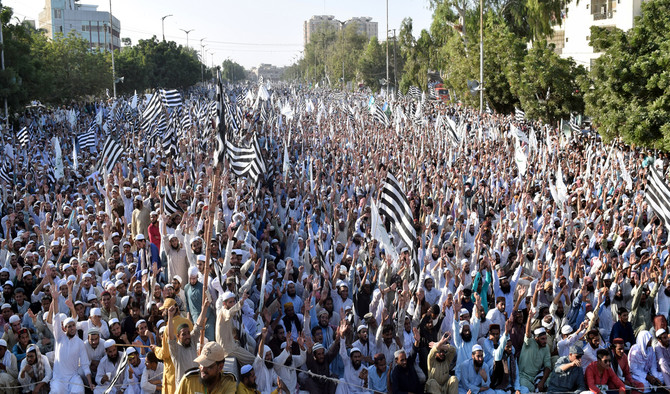KARACHI: Thousands, mostly students from Islamic seminaries, rallied along Karachi’s Shahrah-e-Qaideen road on Thursday as local media reports permeated Pakistan’s circles that Aasia Bibi has been released and was likely to leave the country soon.
Addressing the “Tafuz-e-Namoose Resalat” march, leaders of the Muttahida Majlis-e-Amal (MMA) announced plans for a countrywide protest on Friday, a million march on November 15 in Lahore, and a rally in Sukkar on November 25. They said that they would continue protesting against the apex court’s decision to acquit Bibi of all charges, which they termed as “unacceptable”.
“Aasia Bibi has been released and is now in the government’s custody. She may be flown out of Pakistan any moment,” Saiful Mulook, Bibi’s lawyer, had said in an exclusive interview to Arab News, earlier on Wednesday.
However, denying local media reports, Foreign Office Spokesperson, Dr Mohammad Faisal said on Thursday that Bibi was still in Pakistan. “There is no truth to reports of her leaving the country — its fake news,” he said.
Maulana Fazlur Rehman, chief of the MMA -- an alliance including the Jamaat-e-Islami Pakistan (JIP), the Jamiat Ulema-e-Islam Fazal (JUI-F), and representing all schools of thoughts -- said that the powerful institutions of Pakistan had become “the beloved of international forces”.
“By participating in the march in such a huge number, the people of Karachi have rejected the supreme court’s verdict to acquit Aasia,” Rehman said. “There will be no compromise in respecting Prophet Muhammad (PBUH),” he said.
“What sort of verdict this is which has frustrated the Muslim world while non-Muslims are cheering it?” Rehman asked. “We will not let the intentional forces succeed in scraping the blasphemy law,” the MMA chief said, urging people to participate in Friday’s protests and in Lahore’s million march.
The JUI-F, on its part, called upon the government to arrest the killers of JUI-S chief Maulana Sami-ul-Haq at the earliest. Haq was killed in a knife attack at his Rawalpindi residence last week. The identity and whereabouts of his killers remains unknown.
Speaking on the occasion, Owais Noorani, leader of Jamiat Ulema-e-Pakistan, a Barelvi component of the MMA, said: “The march is a strong message to the Prime Minister of Pakistan and the international community that those insulting the prophet of Islam will not be allowed to walk free.”
Bibi, 51, was on death row for the past eight years after a lower court found her guilty in 2010. However, citing a lack of credible evidence in the case, the Supreme Court (SC) overturned the ruling last week, acquitting Bibi of all charges. The decision led to massive protests across the country, spearheaded by a far-right religious party, the Tehreek-e-Labbaik Pakistan (TLP), who set several conditions for calling off the protests. Prime among these was that the SC overturns its verdict and places Bibi on the country’s Exit Control List (ECL).
Bibi’s case gained international prominence after a senior politician, who was supporting Bibi throughout her ordeal, was killed for criticizing the country’s blasphemy laws. In January 2011, Punjab Governor Salman Taseer was assassinated by his own guard for speaking in favor of Bibi.
The case came under the spotlight once again following the protests of the past few days which enraged devout Christians around the world and led to several countries offering her asylum. In a tweet to Pakistan’s authorities last night, European parliament’s president, Antonio Tajani thanked the government for moving Bibi to a safe place.


















